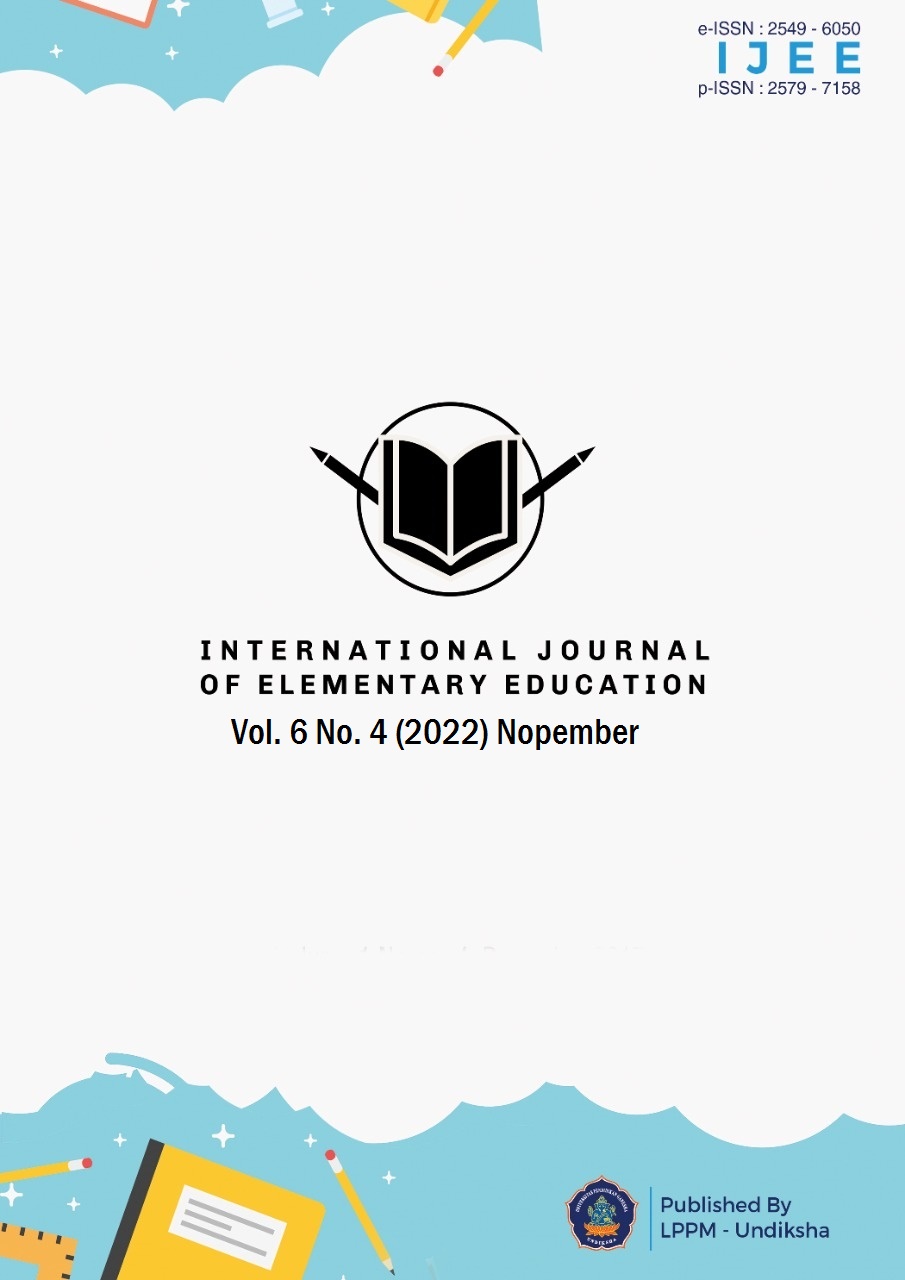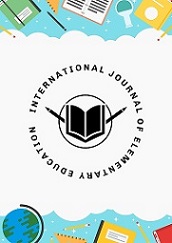The Role of Youth Organizations Village in Developing Talents for Slow Learning Students
DOI:
https://doi.org/10.23887/ijee.v7i1.54860Keywords:
Youth organization village, Slow learner student, Talent developmentAbstract
Talent is a special potential that exists in every child, including children in the slow learner category. It takes efforts from various parties to develop a talent from slow learner students, one of which is Youth Organizations. The purpose of this study was to analyse the role of the Village Youth Organization in developing students' talents in the slow learner category. The method in this study uses a qualitative approach, with an exploratory descriptive design. The research subjects included slow learner students, teachers, and members of Youth Organizations. Data collection techniques are using observation and interviews. Data analysis techniques include data reduction, data display, and data verification. The results of the study show that the types of talents possessed by slow learners include football, painting, and singing. The role of Youth Organizations in efforts to develop the talents of slow learner children is to facilitate every activity that is needed to develop children's potential such as empowering soccer, volleyball activities, holding painting competitions, and calling to prayer competitions. The conclusion in this study is that most of the talents of slow learner children are in sports, where developing their talents is facilitated by holding several competitions and forming a sports team.
References
Ardiwinata, J. S., & Mulyono, D. (2018). Community Education in the development of The Community. Empowerment, 7(1), 25–35. http://e-journal.stkipsiliwangi.ac.id/index.php/empowerment/article/61. DOI: https://doi.org/10.22460/empowerment.v7i1p25-35.661
Chauhan, M. S. (2011). Slow Learners: Their Psychology and Educational Programmes. International Journal of Multidisciplinary Research, 1(8), 279–289. https://www.academia.edu/download/54854309/22_VOL_1_ISSUE8_ZEN.pdf.
Cleugh, M. F. (2021). Teaching the’Slow’Learner in the Secondary School. Routledge. DOI: https://doi.org/10.4324/9781003174301
Collins, K. H. (2018). Confronting color-blind STEM talent development: Toward a contextual model for Black student STEM identity. Journal of Advanced Academics, 29(2), 143–168. https://doi.org/10.1177/1932202X18757958. DOI: https://doi.org/10.1177/1932202X18757958
Crisandye, Y. F. (2018). Peran Karang Taruna dalam Pengembangan Kreativitas Remaja (Studi kasus di Karang Taruna Remaja Kita RW 14 kelurahan Cibeber Kecamatan Cimahi selatan). Jurnal Comm-Edu, 1(3), 94–100. https://journal.ikipsiliwangi.ac.id/index.php/comm-edu/article/view/2101. DOI: https://doi.org/10.22460/comm-edu.v1i3.2101
Desmet, O., Crimmins, D., Seigfried-Spellar, K. C., & Gentry, M. (2022). AME+ Cyber: Evaluating the online delivery of a holistic cyber-related talent development program. Gifted Education International, 38(1), 3–24. https://doi.org/10.1177/02614294211054361. DOI: https://doi.org/10.1177/02614294211054361
Diani, A. A., & Sukartono. (2022). Peran Guru dalam Penilaian Autentik pada Pembelajaran Tematik di Sekolah Dasar. Jurnal Basicedu, 6(3), 4351–4359. https://doi.org/10.31004/basicedu.v6i3.2831. DOI: https://doi.org/10.31004/basicedu.v6i3.2831
Dubas, J. S., & Snider, B. A. (2020). The role of community-based youth groups in enhancing learning and achievement through nonformal education. Early Adolescence, 6(2), 159–174. https://www.taylorfrancis.com/chapters/edit/10.4324/9781315789170-13. DOI: https://doi.org/10.4324/9781315789170-13
Dubey, R., Paul, J., & Tewari, V. (2022). The soft skills gap: a bottleneck in the talent supply in emerging economies. The International Journal of Human Resource Management, 33(13), 2630–2661. https://doi.org/10.1080/09585192.2020.1871399. DOI: https://doi.org/10.1080/09585192.2020.1871399
Frankiewicz, B., & Chamorro, T. (2020). Digital transformation is about talent, not technology. Harvard Business Review, 6(3), 1–8. https://www.jasperdonkers.nl/wp-content/uploads/2022/04/20200507-HBR-Digital-Transformation-Is-About-Talent-Not Technology.
Gagné, F. (2018). Academic talent development programs: A best practices model. Asia Pacific Education Review, 16(2), 281–295. https://doi.org/10.1007/s12564-015-9366-9. DOI: https://doi.org/10.1007/s12564-015-9366-9
Gaho, R., Zagoto, S. F. L., & Telaumbanua, K. (2022). Peran Organisasi Karang Taruna dalam Menanggulangi Perilaku Menyimpang Pemuda Desa Hilinamozaua Kecamatan Onolalu. Counseling For All: Jurnal Bimbingan Dan Konseling, 2(1), 1–7. https://jurnal.uniraya.ac.id/index.php/Counseling/article/468.
Ghifari, M., Kholilah, A., & Naufa, M. (2021). Pengenalan Lukis Kaca sebagai Media Hias dan Cendera Mata pada Siswa-Siswa SMAN 1 Jantho. Gorga : Jurnal Seni Rupa, 10(1), 73–79. https://jurnal.unimed.ac.id/2012/index.php/gorga/article/view/21107. DOI: https://doi.org/10.24114/gr.v10i1.21107
Herpratiwi, H., & Tohir, A. (2022). Learning interest and discipline on learning motivation. International Journal of Education in Mathematics, Science and Technology, 10(2), 424–435. https://doi.org/10.46328/ijemst.2290. DOI: https://doi.org/10.46328/ijemst.2290
Hidayanti, I. (2019). Partisipasi Orang Tua Siswa Lamban Belajar (Slow Learner) di Kelas II SD Negeri Margosari Pengasih. Jurnal Pendidikan Guru Sekolah Dasar, 20(8), 1–9. https://journal.student.uny.ac.id/index.php/pgsd/article/view/15561.
Kinesti, R. D. A., Maharani, T., & Maesaroh, E. (2022). Peran Guru dalam Meningkatkan Keterampilan Minat Bakat Siswa melalui Kegiatan Ekstrakurikuler di SD Istiqamah Bandung. Arzusin: Jurnal Manajemen Dan Pendidikan Dasar, 2(4), 311–323. https://ejournal.yasin-alsys.org/index.php/arzusin. DOI: https://doi.org/10.58578/arzusin.v2i4.449
Korikana, A. (2020). Slow learners-a universal problem and providing educational opportunities to them to be a successful learner. PEOPLE: International Journal of Social Sciences, 6(1), 29–42. https://doi.org/10.20319/pijss.2020.61.2942. DOI: https://doi.org/10.20319/pijss.2020.61.2942
Kusmarheni, F., Wiarsih, N., & Meliantina. (2022). Pengembangan Modul Pramuka Penggalang di SD Islam Kebunrejo Genteng. Atta’lim: Jurnal Madrasah Ibtidaiyah, 1(2), 94–106. https://doi.org/http://ejournal.iaiibrahimy.ac.id/index.php/attaklim/article/view/1531.
Lee, S. Y. (2021). Supportive Environments for Developing Talent 2. In the Social and Emotional Development of Gifted Children, 191–204. https://www.taylorfrancis.com/chapters/10.4324/9781003238928-18/supportive-environments-developing-talent-2-seon-young-lee. DOI: https://doi.org/10.4324/9781003238928-18
Linuriya, E. (2022). Peran Guru BK dalam Mengoptimalkan Prestasi Akademik Anak Slow Learner di SMP N 13 Bayung Lencir. Jurnal Pendidikan Dan Konseling, 4(3), 1967–1971. https://doi.org/10.31004/jpdk.v4i3.4996.
Magdalena, I., Fatharani, J., Oktavia, S. A., & Amini, Q. (2020). Peran Guru dalam Mengembangkan Bakat Siswa. Pandawa: Jurnal Pendidikan Dan Dakwah, 2(1), 61–69. https://ejournal.stitpn.ac.id/index.php/pandawa.
Makkonen, T., Lavonen, J., & Tirri, K. (2022). Factors That Help or Hinder The Development of Talent In Physics: A Qualitative Study of Gifted Finnish Upper Secondary School Students. Journal of Advanced Academics, 33(4), 507–539. https://doi.org/10.1177/1932202X221111828. DOI: https://doi.org/10.1177/1932202X221111828
Mansyur, A. R. (2022). Telaah Problematika Anak Slow Learner dalam Pembelajaran. Journal Education and Learning, 3(1), 28–35. https://doi.org/10.33096/eljour.v3i1.1 47. DOI: https://doi.org/10.33096/eljour.v3i1.137
Manunggal, S. (2015). Buku Karang Taruna Setyo Manunggal. Setyo Manunggal.
Meuraksa, M. A. W., & Saputra, A. A. (2020). Peranan Karang Taruna dalam Upaya Penyelenggaraan dan Pembangunan Kesejahteraan Sosial Kecamatan Pamulang. Humanika: Jurnal Ilmu Sosial, Pendidikan, Dan Humaniora, 4(1), 7–23. http://humanika.penapersada.com/index.php/humanika/article/80.
Meyer, M. S., & Rinn, A. N. (2022). School‐Based Leadership Talent Development: An Examination of Junior Reserve Officers’ Training Corps Participation and Postsecondary Plans. Journal for the Education of the Gifted, 45(1), 4–45. https://doi.org/10.1177/01623532211063937. DOI: https://doi.org/10.1177/01623532211063937
Muppudathi, G., Education, A., John, S., & College, D. B. (2014). Role of Teachers on Helping Slow Learners to Bring Out Their Hidden Skills. Ijsr -International Journal of Scientific Research, 3(2277), 98–99. https://www.academia.edu/download/34288348/Role_of_Teachers_on_Helping_Slow_Learners_to_Bring_out_their_Hidden_Skills.pdf.
Mustaeva, G., Kurbanova, M., & Mamajanova, G. (2022). The Place and Role of Using Pedagogical Technologies in Learning English. Uzbek Scholar Journal, 9(1), 191–193. https://uzbekscholar.com/index.php/uzs/article/view/298.
Oktaviani, T., Damanhuri, D., & Legiani, W. H. (2019). Peranan Karang Taruna dalam Menumbuhkan Kepedulian Sosial Pemuda. Pro Patria: Jurnal Pendidikan, Kewarganegaraan, Hukum, Sosial, Dan Politik, 2(2), 112–124. https://doi.org/10.47080/propatria.v2i2.587. DOI: https://doi.org/10.47080/propatria.v2i2.587
Prasetyo, T., Rachmadtullah, R., Samsudin, A., & Aliyyah, R. R. (2021). General Teachers’ Experience of the Brain’s Natural Learning Systems-Based Instructional Approach in Inclusive Classroom. International Journal of Instruction, 14(3), 95–116. https://eric.ed.gov/?id=EJ1304696. DOI: https://doi.org/10.29333/iji.2021.1436a
Pratama, F. F., & Rahmat, R. (2018). Peran karang taruna dalam mewujudkan tanggung jawab sosial pemuda sebagai gerakan warga negara. Jurnal Civics: Media Kajian Kewarganegaraan, 15(2), 170–179. https://doi.org/10.21831/jc.v15i2.19182. DOI: https://doi.org/10.21831/jc.v15i2.19182
Prima, Y., Sari, Y. I., & Putra, D. F. (2021). Peran Karang Taruna dalam Pembangunan Desa Pandanrejo Kecamatan Bumiaji Kota Batu. JPIG: Jurnal Pendidikan Dan Ilmu Geografi, 6(2), 146–156. http://ejournal.unikama.ac.id/index.php/JPIG/. DOI: https://doi.org/10.21067/jpig.v6i2.4950
Puji, A. N. D., & Aras, A. (2022). Eksplorasi Hasil Belajar Matematika melalui Pendekatan Matematika Realistik Ditinjau dari Kemampuan Numerik. JMLI: Journal of Mathematics Learning Innovation, 1(1), 1–15. https://dx.doi.org/235/jmli/324. DOI: https://doi.org/10.35905/jmlipare.v1i1.3257
Putra, N. D., & Purbodjati. (2022). Upaya Pengembangan Minat Bakat Olahraga pada Ekstrakulikuller pada Siswa Kelas 5 di SDN Canditunggal Kecamatan Kalitengah Kabupaten Lamongan Tahun 2022. Jurnal Kesehatan Olahraga, 10(3), 37–42. https://ejournal.unesa.ac.id/index.php/jurnal-kesehatan-olahraga/article/view/48009.
Putra, T. D. (2022). Observasi Bakat Menggunakan Aplikasi Talents Mapping untuk Orang Tua Siswa Sekolah Alam Tangerang. JUCOSCO: Journal of Computer Science Contributions, 2(1), 1–10. https://ejurnal.ubharajaya.ac.id/index.php/jucosco. DOI: https://doi.org/10.31599/jucosco.v2i1.866
Putri, N. A., Suhendra, & Yono. (2022). Konsep Pengembangan Fitrah Bakat pada Jenjang Pendidikan SMA di AB HOME BOGOR. KOLONI: Jurnal Multidisiplin Ilmu, 1(4), 13–17. https://doi.org/10.31004/koloni.v1i4.261.
Rana, A. M. K., Jehanghir, M., Rehman, S. U., Ishaq, K., & Abid, A. (2021). Classroom Practices for Slow Learners in the Punjab, Pakistan. Journal of the Research Society of Pakistan, 58(1), 159. http://pu.edu.pk/images/journal/history/PDF-FILES/19_58_1_21.pdf.
Santoso, S., Negara, I. H. P., Damayanti, N. K. L. P., Putri, Y. R., Purnomo, O. R., & Gago, M. S. (2021). Kegiatan “Festival Anak Negeri” sebagai Wadah Pengembangan Bakat Siswa di Tengah Pandemi Covid-19. DE JOURNAL: Dharmas Education Journal, 2(2), 287–294. http://ejournal.undhari.ac.id/index.php/de_journal. DOI: https://doi.org/10.56667/dejournal.v2i2.385
Schroth, S. T., & Slade, M. L. (2021). Talent development: From theoretical conceptions to practical applications. In Handbook for Counselors Serving Students with Gifts & Talents, 45–62. DOI: https://doi.org/10.4324/9781003235415-5
Suradi, S. (2019). Karang taruna, agen perubahan dan pengembangan masyarakat di pandeglang. Sosio Konsepsia: Jurnal Penelitian Dan Pengembangan Kesejahteraan Sosial, 8(3), 241–254. https://doi.org/10.33007/ska.v8i3.1676. DOI: https://doi.org/10.33007/ska.v8i3.1676
Sutrisna, I. W. (2022). Meningkatkan Partisipasi Pemuda dalam Pembangunan Desa melalui Optimalisasi Peran Karang Taruna. Jurnal Cakrawarti, 5(2), 16–24. https://doi.org/10.47532/jic.v5i2.648.
Taufik, Z. (2020). From Negative To Positive Peace: Strengthening The Role of Youth in Religious Peacebuilding in Bukittinggi, West Sumatra. Akademika: Jurnal Pemikiran Islam, 5(2), 257–276. https://doi.org/10.32332/akademika.v25i2.2132. DOI: https://doi.org/10.32332/akademika.v25i2.2132
Widiastuti, N. (2018). Peran Tokoh Pemuda Dalam Meningkatkan Partisipasi Karang Taruna Di Desa Nanjung Margaasih. Comm-Edu: Community Education Journal, 1(2), 94–104. https://doi.org/10.22460/comm-edu.v1i2.334. DOI: https://doi.org/10.22460/comm-edu.v1i2.334
Widodo, A., Indraswati, D., Sutisna, D., Nursaptini, & Novitasari, S. (2020). Identifikasi Bakat Peserta Didik Berkebutuhan Khusus (PDBK) di Madrasah Inklusi Kabupaten Lombok. Jurnal Pendidikan Inklusi, 3(2), 102–116. https://doi.org/10.26740/inklusi.v3n2.p102-116. DOI: https://doi.org/10.26740/inklusi.v3n2.p102-116
Wildová, R., & Kropáčková, J. (2015). Early Childhood Pre-reading Literacy Development. Procedia - Social and Behavioral Sciences, 191, 878–883. https://doi.org/10.1016/j.sbspro.2015.04.418. DOI: https://doi.org/10.1016/j.sbspro.2015.04.418
Downloads
Published
How to Cite
Issue
Section
License
Copyright (c) 2023 Fitria Ayu Aryanti

This work is licensed under a Creative Commons Attribution-ShareAlike 4.0 International License.
Authors who publish with the International Journal of Elementary Education agree to the following terms:
- Authors retain copyright and grant the journal the right of first publication with the work simultaneously licensed under a Creative Commons Attribution License (CC BY-SA 4.0) that allows others to share the work with an acknowledgment of the work's authorship and initial publication in this journal.
- Authors are able to enter into separate, additional contractual arrangements for the non-exclusive distribution of the journal's published version of the work (e.g., post it to an institutional repository or publish it in a book), with an acknowledgment of its initial publication in this journal.
- Authors are permitted and encouraged to post their work online (e.g., in institutional repositories or on their website) prior to and during the submission process, as it can lead to productive exchanges, as well as earlier and greater citation of published work. (See The Effect of Open Access)










